Politics
Election Petition Judgment: Why Supreme Court Can’t Overturn Tinubu’s Disqualification
As the Presidential Election Petition Tribunal progresses, Nigerians are already looking forward to how the judges will decide.
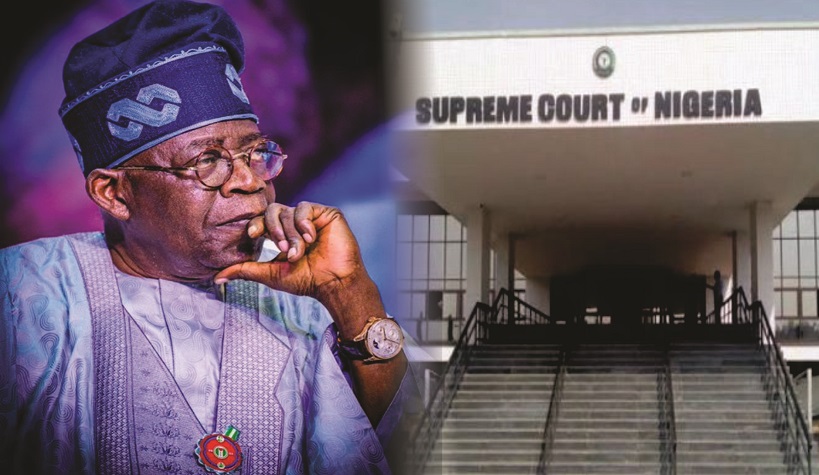
As the Presidential Election Petition Tribunal progresses, Nigerians are already looking forward to how the judges will decide, not just at the tribunal level but also at the Supreme Court.
Confidence is very low, and one can’t blame people for feeling this way. Because base on recent rulings of the Supreme Court have turned logic and the law upside down, so it’s understandable that people lose confidence.
This Online News platform understands that many people might be saying that all judges are the same, they have collected money, they have taken bribes and believing that nothing will come out of it, that no one can remove a sitting president. These are just some of the many permutations and issues being discussed.
However, when one looks at the gravity of what Tinubu has done and all the baggage that comes with him, along with the massive evidence presented in court, the judges at the Supreme Court will need to go to extreme levels in order to free Tinubu.
There have been many judicial precedents that the Supreme Court Justices have been a part of in the past few years. While the Supreme Court has the right to revisit a case or reverse their decisions if they have new information, the question is, how many times will they do this in order to free Tinubu?
If it’s just one judgment that they need to reverse, people might think it’s just a one-off and public opinion might not be against them. However, when you consider that they would need to reverse multiple judgments, say one, two, three, four, five, six, or even seven, in order to free him, it becomes a matter of morality rather than just taking bribes or favoring someone.
And it doesn’t stop there. What about the implications of the judgment if they eventually overturn all past judgments in order to favor him? What would that mean for Nigeria going forward in terms of politics and governance? It would undoubtedly change the political landscape in Nigeria.
For example, the Supreme Court judgment that made Lawan, who didn’t contest for the senatorial primaries, to become the winner of the election. Before this judgment, it was possible for someone who didn’t contest the elections properly but won the primary election at the party level to become the winner of the election.
That was how Wike became the governor of River State. He won the PDP governorship primaries, but somehow INEC put Celestine Omehe’s name on the ballot for the general election, and the Supreme Court restored him. Many people hailed the Supreme Court for delivering justice in that case. However, why didn’t many people hail the Supreme Court when they delivered judgments on Lawan’s case and that of Akpabio?
It shows that something was definitely wrong with those judgments. Now, let’s look at the first judgment that the Supreme Court Justices would need to overturn in order to free Tinubu.
25% in FCT
In 2003, Buhari lost the presidential election to Obasanjo and went to the presidential election petition tribunal. Eventually, the Supreme Court ruled that despite Obasanjo not winning Abuja, what was needed was for the candidate to score at least 25 percent of the total votes cast in the Federal Capital Territory (Abuja).
It was the first judicial interpretation of the 25 percent requirement in Abuja since the Fourth Republic began. The Supreme Court interpreted it as a presidential candidate needing to score 25 percent in two-thirds of the states in Nigeria, must still score 25 percent in Abuja. This was the interpretation.
The next judicial precedent that the Supreme Court Justices would need to overturn was set back in 2008 in the case of Buhari versus Yar’Adua. Buhari sought the cancellation of the presidential election because Yar’Adua didn’t win Abuja.
However, the Supreme Court Justices that sat on the panel disagreed with him. They followed the earlier precedent of 2003 and ruled in the same manner that 25 percent was only required in Abuja, not a win. Therefore, they struck off Buhari’s petition.
So based on the 25 percent requirement, the Supreme Court has already made two judgments stating that a presidential candidate must win 25 percent in Abuja before being declared the winner.
And Tinubu obviously did not achieve this required percentage in the FCT, and since this section of the Constitution was not amended before the presidential election, it becomes a dead end for Tinubu. He cannot escape it. The Supreme Court has no option but to follow precedent by annulling his victory.
Regardless of how people feel about the 25 percent requirement in Abuja, it is still the law, and the law must be upheld. It is practically impossible for someone to have 25 percent in all 36 states of the Federation without having it in Abuja. Abuja represents all Nigerians, so if you are already popular in some states in Nigeria, it means you’re popular in Abuja as well.
DON’T MISS: INEC ICT Director To Testify Against Obi, Atiku As Tribunal Reconvenes July 3
All past presidents, including MKO Abiola, scored the required 25 percent in Abuja. Therefore, the case of Tinubu won’t be different.
Tinubu’s $460,000 forfeiture in US
The second judgment that they will need to overturn was delivered in 2014, and as faith will have it, the current Chief Justice of Nigeria was part of the panel of judges that delivered the judgment in that groundbreaking case of Abacha versus the Federal Republic of Nigeria.
The Supreme Court ruled that if a forfeiture is a result of a crime, there can be no forfeiture if there is no crime. If someone forfeits something that means a crime was committed. Therefore, so this judgment, this judicial precedent, will ensure that Tinubu is disqualified. Tinubu forfeited $460,000 to the United States government, funds that were traced to narcotics trafficking.
So the hands of the Supreme Court judges, including the Chief Justice, are tied. They cannot do otherwise but to disqualify Tinubu. The fourth judgment that they will need to overturn in order to save Tinubu is the one they delivered in 2017.
Two Supreme Court justices who delivered that judgment are still serving at the Supreme Court. In the unanimous judgment, they disqualified the PDP candidate because he forged his certificate. Looking at the evidence that Atiku’s witnesses submitted at the Presidential Election Petition Tribunal, you will see that the Supreme Court justices have no option but to take a clue from the earlier judicial precedent they themselves set in 2017. Or will they treat Tinubu differently?
Certificate Forgery
The next case that ties the hands of the Supreme Court justices is the one they delivered in 2020. That judgment disqualified diri/ David Lyon because his deputy forged a certificate.
The significant takeaway from that judgment is that the Supreme Court understood that time was of the essence. They disqualified him 24 hours before he was supposed to take the oath of office. They understood that politicians who didn’t win elections or violated some laws in the process shouldn’t be allowed to enjoy the office even for a day.
So it can be done even without amending relevant sections of the law. Election disputes can be resolved before swearing in, so only people who truly got the mandate of the people will be sworn into office.
INEC Failure to follow the guidelines as Electoral ACT 2022
The next one is the one they delivered this year, Oyetola versus Adeleke. In that judgment, the Supreme Court upheld and reinforced all the guidelines and processes involved in the conduct of elections. All these processes and guidelines were not obeyed by INEC during the election. They conducted the election without recourse to the guidelines.
So Will the Supreme Court justices then turn around and say that collation can happen without reference to the IREV? Will they say that IREV is no longer required despite it being in the Electoral Act that a collation officer must consult the copies of IREV before starting collation at the ward level?
If they say that IREV is not required, because IREV is the main thing because without IREV it means any rigged result can be collated without verification. The last one is not actually a judgment, but the impact of how they will decide. If they say YES (Tinubu not sacked) that someone with all these baggage and violations, and even with INEC’s non-compliance, actually won and can continue in office, it means going forward, anybody with even more baggage can find their way and become the president or governor or contest in any elective position.
So going forward, it will change the political landscape in Nigeria. If, at the end of the day, with all the judicial precedents that they themselves have set, they turn around and say, “No, put this aside, this man won, let him continue,” well, the world and Nigerians are watching.







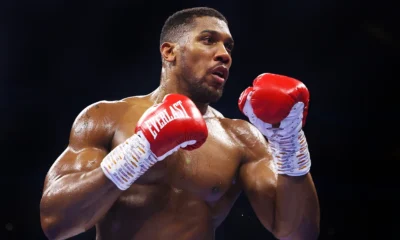





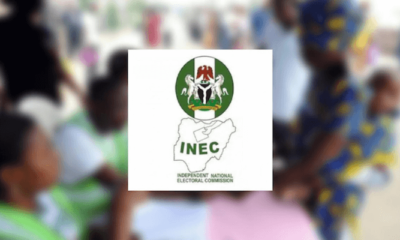

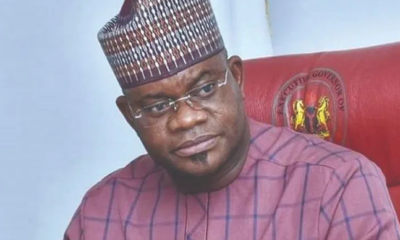

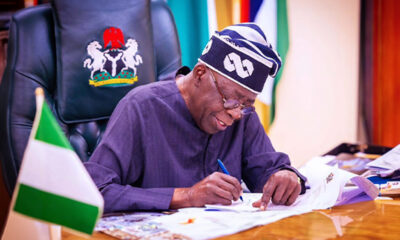

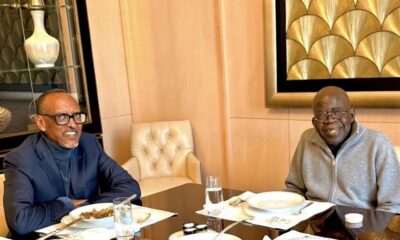

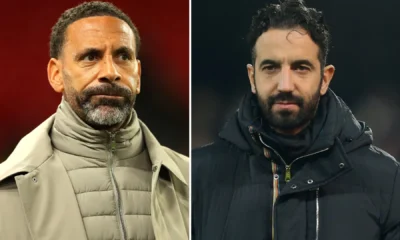

You must be logged in to post a comment Login